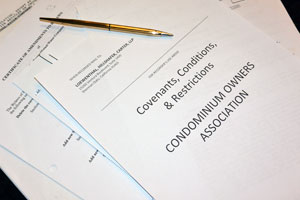Uncontested Board of Directors Elections: Do You Really Have to Hold an Election?
An issue plaguing associations, managers and counsel is whether an association must comply with California Civil Code §1363.03 et. seq., for director elections if the nominations result in an uncontested election. The answer to this question largely depends upon who you ask, as the “law” on uncontested elections is far from settled. This article focuses on the two schools of thought concerning whether the formality of an election is required when the number of candidates is equal to or less than the number of seats available on the board.
Typical language in association bylaws provide that annual meetings of members shall be held on or about the anniversary date of the initial member meeting and that at each annual meeting members shall elect a board of directors. (The term “shall” indicates that the performance of an act is mandatory, unless there are express exceptions.)
Civil Code §1363.03(b) states, “Notwithstanding any other law or provision of the governing documents, elections regarding assessments legally requiring a vote, election and removal of the members of the association’s board of directors [. . .] shall be held by secret ballot in accordance with the procedures set forth in this section.” The Legislature included the word “shall” which seems to suggest that compliance with the formal election procedure is required. This position is supported by the fact that the statute does not create an exception applicable to uncontested elections.
Based on Civil Code §1363.03, et. seq. and the absence of express language creating an exception for uncontested elections, a strict interpretation of Civil Code is that all elections of directors must be conducted annually, or as otherwise indicated in the association’s bylaws, and in accordance with Civil Code §1363.03 via secret ballot.
However, not all legal professionals in this industry believe that an uncontested election requires an association to proceed with the formal secret ballot process. The purpose of Civil Code §1363.03 et. seq. is to ensure that elections in associations are conducted with a similar level of fairness and privacy as governmental elections. When the results of the election process are known, as in the case of an uncontested election, the concerns over fairness and privacy are no longer at issue.
The primary issue for an association in an uncontested election is to ensure that the qualified self-nominated candidates are seated on the board in the manner that conserves the limited financial resources of the association. Under this school of thought, dispensing with the formal secret ballot process in an uncontested election does not take away from an association’s obligation to solicit candidates to replace the terms of then-expiring directors or to proceed with the election when more candidates are running than seats are available. It simply allows then serving board of directors to make a decision to act in the best interest of the corporate entity and members.
In short, while there is no express exception to the secret ballot process in Civil Code
§1363.03 et. seq., under this position the absence of such an exception merely reflects a disconnect between the Legislature and practical, day-to-day operations of common interest developments. Unfortunately, this disconnect is seen all too often and can end with legislation imposed on our industry.
Obviously the most conservative approach when it comes to uncontested elections is to follow the letter of the statute and mail secret ballots and conduct the election as the association otherwise would in a contested election. For those associations who are willing to take a calculated risk in dispensing with the secret ballot process as prescribed by statute, a member challenge may arise in which case the position that conserving limited financial resources outweighs the formality of conducting an election with a known result will once and for all be decided by a court of law. Thus, the benefit of saving money on conducting formal elections must be reconciled with the potential risk of a subsequent challenge.
Unless and until this issue of uncontested elections is settled in court or addressed by the Legislature, associations must rely upon the guidance and advise of their individual legal counsel to assist them in making the right decision for the association and its members.
Reprinted with permission from California Association of Community Managers, Inc. (CACM) The Law Journal (Copyright, 2009, CACM)


